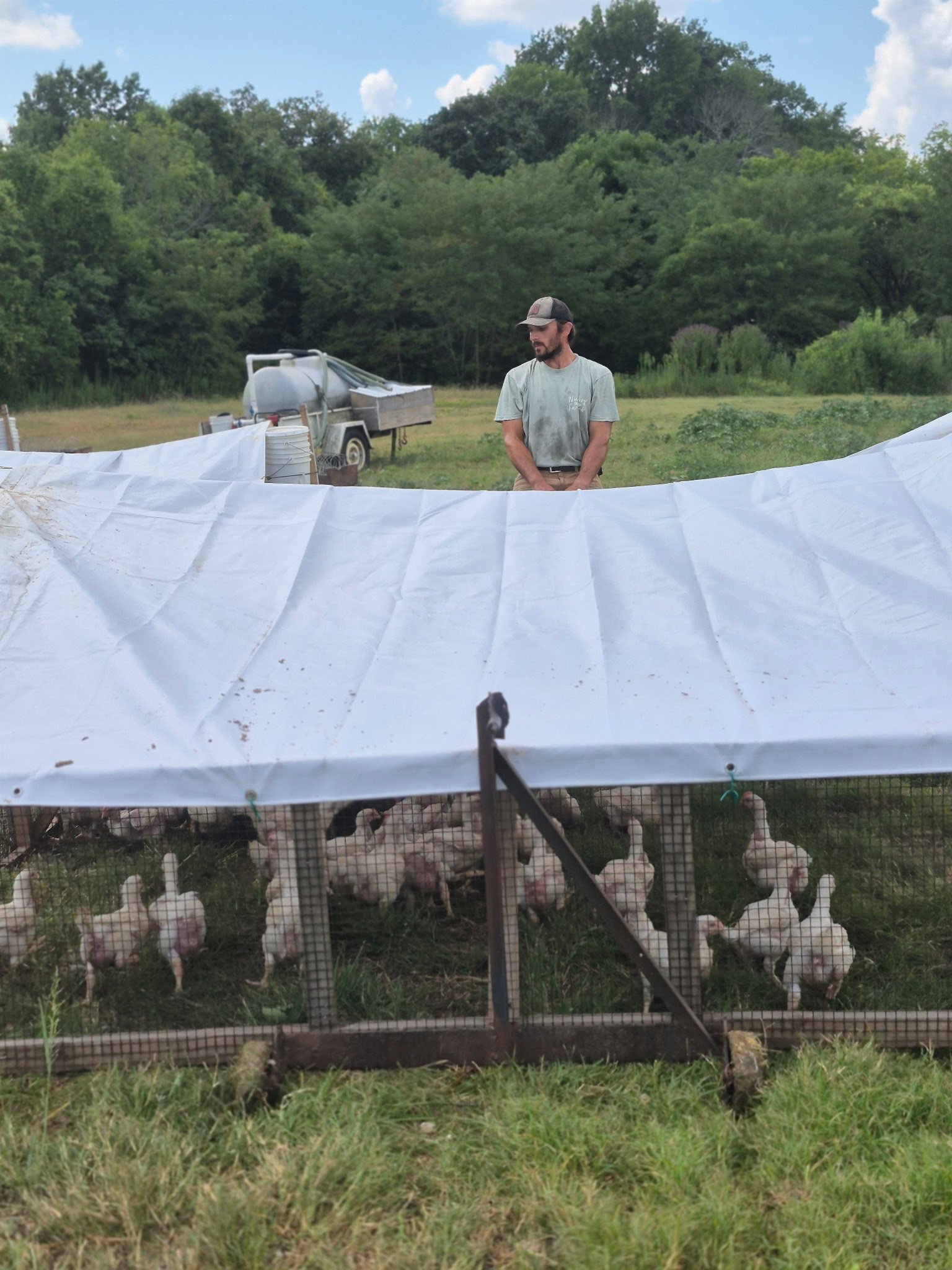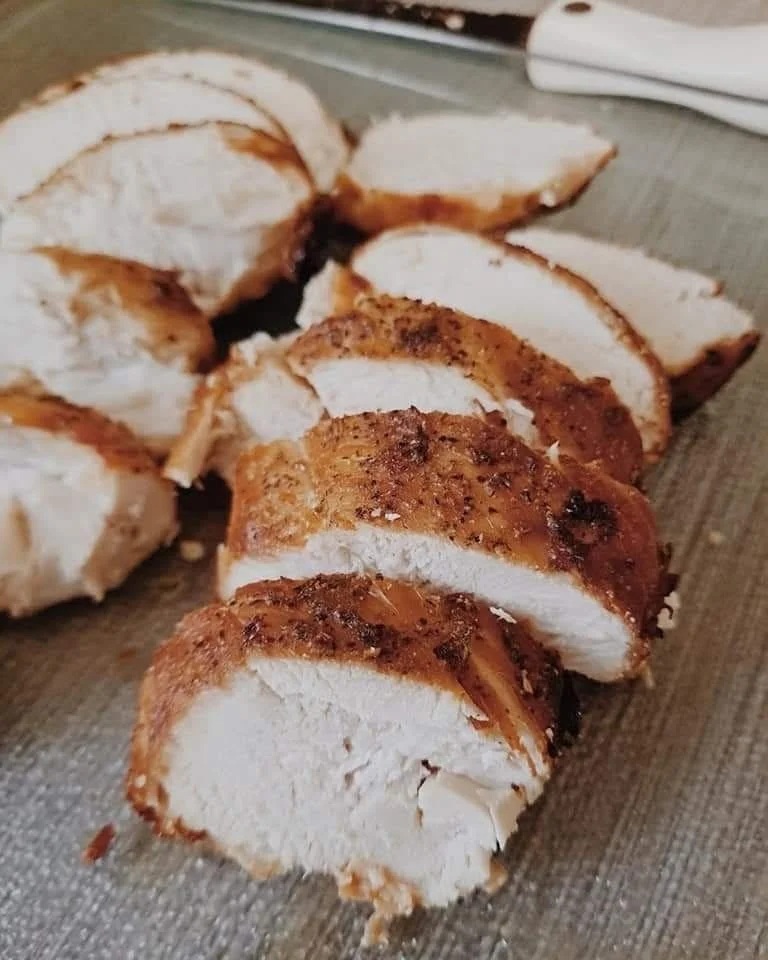Our Process
Organic. Soy-Free. Pasture-Raised. Non-medicated. Non-vaccinated. 100% Transparency.
Growing Methods
In keeping with their desire to best steward the available resources, Nubby Farms raises meat chickens and egg laying chickens on grass in accordance with the American Pastured Poultry Producers Association (APPPA) guidelines.
In short, the chickens raised on Nubby Farms all spend the majority of their lives on grass with daily access to fresh grass and sunshine. Nubby Farms uses no artificial lighting or heat sources outside of the brooding phase of chick development. As an active member of APPPA, Nubby Farms is proud to comply with their guidelines.
Additionally, Nubby Farms uses 100% non-medicated, non-vaccinated birds for both meat and eggs. Nubby Farms manages bird health by keeping the surrounding environment clean and fresh, with movement to fresh grass, plenty of sunshine, and other natural remedies if needed (organic apple cider vinegar, desiccated organic beef liver, etc).
-
The middle Tennessee weather typically allows for a pastured-poultry season that has the first meat birds on pasture by the end of March, and the last meat birds off of pasture by the end of October. Staying within the seasonal limits ensures healthy pasture and exerts less stress on the birds. Nubby Farms currently uses the 308 Cornish Cross sourced from Amish-owned Cedar Valley Harness near Elkton, KY.
These chicks are non-medicated and non-vaccinated. After leaving the brooder at 14-21 days old, meat chickens are kept safe on grass through the use of 10 foot wide by 12 foot long by 2 foot tall shelters that are bottomless (fully open to the grass). Each shelter includes a gabled 10 foot by 12 foot white tarp that provides shade and protection against rain. Each shelter holds 70-80 chickens. Within each shelter are two broiler drinkers offering free access to fresh water and two trough style feeders offering free access to the soy-free, certified organic broiler grower feed (in addition to the natural forage available from the pasture). The shelters are moved by hand every day to fresh grass ensuring a sanitary environment for the broilers. These shelters are very similar to what is referred to as “Salatin Style Shelters.”
In addition to the forage and bugs found on pasture, the meat chickens are fed a complete ration of certified organic, soy-free feed sourced from Kentucky Organic Farm and Feed, Inc.
-
Nubby Farms currently utilizes a mix of high producing brown or white egg layers in combination with some colored egg layers (approximately 70% high producing layers and 30% colored layers). Egg laying chicks are sourced from Hoover’s Hatchery and arrive non-medicated and non-vaccinated.
Egg layers spend the first 5-7 weeks in the brooder. After leaving the brooder, the pullets are housed in a stationary transition paddock that includes a coop and a 75 foot by 75 foot yard. Once the first eggs are laid, the layer flock is moved to pasture and combined with the one-year-old flock from the previous season. The two-year-old flock is then sold as “two-year-old layers” to backyard chicken enthusiasts. With this rotation, each year Nubby Farms adds new layers and sells off old layers.
The laying flock is housed in a mobile coop on pasture from mid-April to early November. The layers are protected by a combination of stationary fencing and mobile fencing. The flock is secured in the coop each night and let out to grass each day. The coop is just large enough for roostings to ensure the layers spend the entirety of daylight hours outdoors. However, the coop is elevated from ground level to provide shade and protection as needed. The coop has external layboxes and waterers. Approximately every 5-7 days the coop is moved to an area of fresh grass and the mobile fence is relocated.
During winter months, to protect the pasture, the egg laying flock is relocated to the Nubby Farms garden plot where they spend the winter fertilizing the garden soil and spreading carbonaceous material to help rebuild the soil. Even in the coldest of winter months, the egg layers typically produce a sufficient crop of eggs daily.
In addition to the natural forage from the grass, egg layers are fed a complete ration of certified organic, soy-free feed from Kentucky Organic Farm and Feed, Inc.
Egg Processing & Packaging
Nubby Farms eggs are gathered from the coop twice daily to ensure the cleanest eggs. Eggs are left with their natural bloom to help preserve freshness and cleanliness. Also, to prevent disturbance of the bloom, eggs packaged for retail sale are minimally handled and unwashed. As such, some eggs may show a minimal amount of marking or contain minor debris, such as a small feather or piece of straw from the nest box. Eggs that are found to be soiled when gathered are kept separate.
Eggs are packaged in one-dozen containers made from recycled materials. While most eggs will be brown or tan, Nubby Farms attempts to package some colored eggs (blue, pink, white, or green) in every egg carton.
Poultry Processing & Packaging
Nubby Farms believes on-farm processing is the most efficient, sustainable way to produce high quality poultry products. On-farm processing minimizes stress on the birds caused by over-the-road transport and minimizes the need for use of other resources common in transport operations. Nubby Farms, to-date, has used on-farm processing in accordance with the USDA poultry producer exemption to P.L. 90-492 for entities processing less than 20,000 birds annually. However, due to a drastic increase in production starting in 2025, Nubby Farms will process and package only whole chickens on-farm. Butchered chicken parts will be processed and packaged at Misty Lea Processing near Elkton, KY (USDA Inspection P40345).
All poultry products from Nubby Farms are sold as unadulterated chicken product. Product is sold frozen to ensure freshness, quality, and safety during sale and transport to the end user. Because the products processed and packaged on-farm are exempted from P.L. 90-492, all labels contain the USDA required date, farm location, and the statement “Exempt: P.L. 90-492”.







